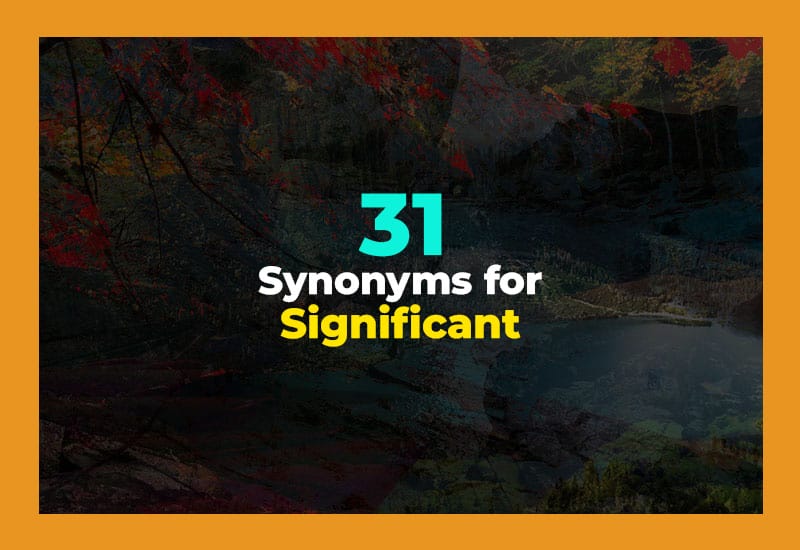You know how sometimes you want to say something is really important or stands out, but you don't want to keep saying the same word? Well, I get it! Using different words like remarkable, crucial, or meaningful makes your speech or writing much more interesting. Let's jump into some easy and fun synonyms for significant that you can use in your daily conversations or stories!
1. Important
Important means something that really matters or has a big effect. For example, "It's important to study for your exams to do well." When something is important, it can change how things happen or how people feel. People use this word all the time because it's simple and clear. If a meeting or event affects your life or work, it's important. Saying something is important shows that you care about it and want others to pay attention too.
2. Notable
Notable describes something or someone worthy of attention because they stand out. For example, "She made a notable improvement in her performance." It means noticeable or deserving praise. When you say something is notable, you highlight that it's special or different from the usual. This word is great when you want to point out achievements or moments that catch your eye. Using notable shows respect and recognition for what makes the subject unique or interesting.
3. Meaningful
Meaningful means full of meaning or value, often touching emotions or ideas. For example, "That was a meaningful gift because it came from the heart." It shows that something is not just ordinary but has deeper importance. When something is meaningful, it has a purpose or makes a difference to you or others. This word is perfect when talking about things that affect feelings, relationships, or memories in a positive way.
4. Major
Major means very large or important in size, number, or effect. For example, "There was a major change in the company's policy." It often shows that something is a big deal or causes big effects. Saying something is major tells others that it's more than just small or minor. You can use it for events, problems, or successes that have a big impact or need serious attention.
5. Serious
Serious means something that is important and should not be taken lightly. For example, "He had a serious injury and needed medical help." It shows that the matter needs careful attention or respect. When you call something serious, you mean it's not a joke or small issue. This word is useful when you want to show the weight or importance of a problem or situation.
6. Remarkable
Remarkable means something that is so unusual or good that people notice it. For example, "She has a remarkable talent for painting." It tells others that the thing or person is special and worth talking about. When something is remarkable, it stands out from the rest because it's impressive. This word is great to show admiration or surprise about achievements or qualities.
7. Substantial
Substantial means large in size, amount, or importance. For example, "They made a substantial donation to the charity." It shows that something is not small or insignificant but has real value or weight. When you say something is substantial, you highlight its meaningful size or effect. This word fits well in business, donations, or any situation where the amount or impact matters a lot.
8. Considerable
Considerable means a large amount or degree. For example, "There was a considerable delay because of the storm." It tells people that something is bigger or more important than usual. Saying something is considerable shows that it deserves attention or thought. It's a polite and clear way to say that the size, time, or effect of something is worth noticing.
9. Momentous
Momentous means very important, especially because it causes big change. For example, "The momentous decision changed the future of the company." It's used for events or choices that are historic or unforgettable. When you say something is momentous, you show that it marks a special time or turning point. This word is great for talking about life-changing moments or important history.
10. Weighty
Weighty means heavy or serious in importance. For example, "The judge made a weighty decision that affected many people." It shows that something has a lot of power or influence. Saying something is weighty tells others it is not light or easy, but carries real responsibility or impact. It's a good word to describe important thoughts, choices, or events.
11. Crucial
Crucial means very important and necessary for success. For example, "It's crucial to arrive on time for the interview." This word shows that without this thing, everything might go wrong. Saying something is crucial means it is a key part of making something work. You can use it for rules, moments, or information that you cannot ignore.
12. Critical
Critical means extremely important, often needing urgent attention. For example, "The patient is in critical condition." It shows that the matter is serious and needs quick action. Saying something is critical highlights the urgency and the impact it can have. This word is common in health, decisions, or safety talks.
13. Vital
Vital means absolutely necessary for life or success. For example, "Water is vital for all living things." It tells people that something cannot be done without. When you say something is vital, you mean it's essential and very important to keep things going. This word fits well in health, work, or survival topics.
14. Influential
Influential means having the power to affect others or events. For example, "She is an influential leader in the community." It shows that a person or thing can change opinions or actions. Saying someone or something is influential means they are important because of their power or effect on others. This word is great for talking about people, ideas, or events that make a difference.
15. Relevant
Relevant means closely connected or appropriate to the matter at hand. For example, "Your comment is relevant to the discussion." It shows that something fits well with the topic or situation. Saying something is relevant tells others it matters for what is being talked about. This word is useful in conversations, schoolwork, or meetings when you want to stay on topic.
16. Outstanding
Outstanding means extremely good or impressive. For example, "He did an outstanding job on the project." It shows that something is much better than others. Saying something is outstanding highlights its high quality or success. This word is often used for work, achievements, or talents that stand out clearly.
17. Exceptional
Exceptional means very unusual and better than normal. For example, "She has an exceptional memory." It tells others that something or someone is rare and special. Saying something is exceptional means it is much higher quality or more impressive than most. This word is perfect when you want to praise someone or something for being above average.
18. Powerful
Powerful means having great strength or influence. For example, "That was a powerful speech that moved everyone." It shows that something can affect people strongly or change things. Saying something is powerful means it has energy, force, or importance. This word is often used for ideas, emotions, or people who make a big impact.
19. Striking
Striking means very noticeable or impressive. For example, "She wore a striking red dress to the party." It shows that something catches attention quickly. Saying something is striking means it stands out because it looks or feels different. This word is great for describing appearances, colors, or moments that are easy to remember.
20. Consequential
Consequential means causing important results or effects. For example, "His choices were consequential for the entire team." It shows that something leads to big changes or outcomes. Saying something is consequential tells others that what happens matters and affects what comes next. This word is useful when talking about decisions, actions, or events that have strong impacts.
21. Impressive
Impressive means making people feel admiration or respect. For example, "The athlete's performance was impressive." It shows that something is very good and deserves praise. Saying something is impressive means it stands out because of skill, size, or quality. This word is often used to highlight achievements or talents that catch attention.
22. Salient
Salient means very important or noticeable. For example, "The report covered all the salient points." It shows that certain facts or ideas are the most important to remember. Saying something is salient means it stands out and should not be missed. This word is useful in writing, speeches, or discussions to focus on key details.
23. Key
Key means very important or essential. For example, "Communication is the key to a good relationship." It shows that something is a main part of success or understanding. Saying something is key tells others it's necessary and central. This word is simple but powerful when you want to explain what matters most.
24. Essential
Essential means absolutely necessary or very important. For example, "Good nutrition is essential for health." It shows that something cannot be left out or ignored. Saying something is essential means it's a must-have or must-do. This word is common in advice, rules, or instructions where certain things are needed to succeed.
25. Fundamental
Fundamental means forming the base or core of something. For example, "Honesty is a fundamental value in friendship." It shows that something is basic but very important. Saying something is fundamental means everything else depends on it. This word is great when talking about ideas, rules, or parts that hold everything together.
26. Noteworthy
Noteworthy means worth paying attention to or remembering. For example, "Her achievements are noteworthy." It shows that something is special or interesting enough to be noticed. Saying something is noteworthy means it deserves respect or recognition. This word fits well when you want to highlight good or important things.
27. Memorable
Memorable means easy to remember because it is special or unusual. For example, "We had a memorable vacation last summer." It shows that something made a strong impression on your mind. Saying something is memorable means it's not ordinary or forgettable. This word is perfect for moments, experiences, or events that stay with you.
28. Historic
Historic means very important in history or likely to be remembered. For example, "That was a historic meeting for peace." It shows that something changed history or will be talked about for a long time. Saying something is historic means it is big and important in a lasting way. This word fits well when talking about events or places with long-term significance.
29. Decisive
Decisive means having the power to make decisions or cause final results. For example, "Her decisive action saved the company." It shows that something helps end doubts or problems quickly. Saying something is decisive means it leads to clear outcomes. This word is great for describing choices, moments, or people who make important decisions.
30. Valuable
Valuable means worth a lot in money or importance. For example, "That advice was valuable to me." It shows that something has great use or meaning. Saying something is valuable means it deserves care and respect. This word fits both things you can buy and ideas or help that matter a lot.
31. Prominent
Prominent means easily seen or important. For example, "She is a prominent figure in the art world." It shows that something or someone stands out and is well-known. Saying something is prominent means it has a high position or strong influence. This word is perfect for people, places, or things that are famous or very important.

Final Thoughts
Using different words for "significant" helps you express ideas more clearly and makes your writing or speech more interesting. From simple words like "important" to fancy ones like "momentous," each synonym adds its own flavor. Try mixing these words to better describe how special or meaningful something is. Whether it's a person, event, or idea, choosing the right word makes your message stronger and more fun to share!









